|
|
|
Sort Order |
|
|
|
Items / Page
|
|
|
|
|
|
|
| Srl | Item |
| 1 |
ID:
137631
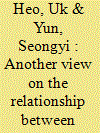

|
|
|
|
|
| Summary/Abstract |
Armed Forces and Society recently published an article, ‘‘Intra-Military Division and Democratization in South Korea’’ by Insoo Kim. In the article, Kim argues that economic development and civil society explanations for South Korea’s democratization are not sufficient because conflict in the military undermined the ability of Chun’s government to suppress the democracy movement, which made the transition possible. We refute Kim’s argument because economic development clearly made significant contribution to South Korea’s democratization by enhancing education attainment and facilitating industrialization and urbanization. Moreover, there is no clear evidence of schism in the military or among political elites, and the authoritarian leader Chun Doo-hwan agreed to change the presidential election system based on his political calculation.
|
|
|
|
|
|
|
|
|
|
|
|
|
|
|
|
| 2 |
ID:
137621
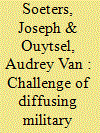

|
|
|
|
|
| Summary/Abstract |
In order to cope with the many violent conflicts all over the world and to enhance their influence, Western armed forces tend to invest in professionalizing the armed forces of developing countries. One way is to educate cadets of such countries at the military academies at home. Following in this wake, Belgium has opened up its military training programs for cadets from Francophone African countries. This article examines the experiences of young men from Benin after they have finished their studies successfully and returned to their parent armed force in this African country. The focus of our analysis is on organizational change through intergenerational diversity reflecting differences in professionalism-related experiences. The findings, suggesting that such organizational change is not self-evident, lead to a discussion about the general implications of diffusing military professionalism to developing countries, in Africa in particular.
|
|
|
|
|
|
|
|
|
|
|
|
|
|
|
|
| 3 |
ID:
137624


|
|
|
|
|
| Summary/Abstract |
This study examines how collective identity based around military school ties influences an individual officer’s achievement in the military. The central premise of this study is that if collective identity can form the basis for fragmented social networks in the South Korean officer corps, it can result in different opportunities for members within different networks. The results presented here demonstrate that collective identities are important explanatory factors to account for this exchange of social resources. All else being equal, the exchange of instrumental and material resources is more likely between military officers who graduated from the same civilian or military school.
|
|
|
|
|
|
|
|
|
|
|
|
|
|
|
|
| 4 |
ID:
137626
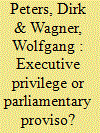

|
|
|
|
|
| Summary/Abstract |
Parliamentary oversight of the military constitutes an important element of the civilian control of the armed forces. However, the strength of parliaments in this realm varies greatly across democracies and little is known about the sources of this variation. We propose an explanation for one key aspect of this variation: why does parliament enjoy veto power over military deployments in some democracies but not in others? Our analysis of data from forty-nine democracies around the world suggests that at least three factors account for parliamentary strength or weakness in this realm: the external threat to which a country is exposed, its constitutional tradition, and the experience of severe military failure in the past.
|
|
|
|
|
|
|
|
|
|
|
|
|
|
|
|
| 5 |
ID:
137628


|
|
|
|
|
| Summary/Abstract |
As captured by neorealist theory, military power became increasingly relative through into the twentieth century, leading to a concentration of power within and between states—and enabling the buildup of huge colonial empires hardly a century ago. Yet since 1945, due to the overproportional effectivity gained by weaker and in particular nonstate actors it has become less relative, leading to a dispersion of power—resulting in an often violent decolonization, the
problems US and North Atlantic Treaty Organization forces have faced in Iraq and Afghanistan in dealing with comparatively small insurgencies and a growing number of failing states. Military power has a selective function: the more relative it is, the more it restricts patterns of conflict as well as the number and nature of actors relevant to international and domestic security. Today, it is because military power is becoming less relative that security policy has to adapt to increasingly asymmetric challenges.
|
|
|
|
|
|
|
|
|
|
|
|
|
|
|
|
| 6 |
ID:
137629
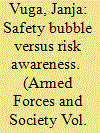

|
|
|
|
|
| Summary/Abstract |
The acceptance of risk in a certain society is tested when de facto or merely potential military death casualties are raised. Several dimensions influencing the acceptability of risk have already been analyzed, although only three are examined in this article—namely, the historicopolitical, sociodemographic, and cultural. The Slovenian public opinion survey persistently shows strong risk aversion among Slovenians and the article’s purpose is therefore to (1) establish how can the strong risk aversion be explained by the selected dimensions; and (2) identify what part of the population is most risk-aversive. To that end, over twenty years of Slovenian public poll data are analyzed using a triangulation of statistical methods, revealing a cultural pattern of safety bubble versus risk awareness. As the risk aversion model reveals, Slovenian society represents a safety bubble, with strong risk aversion and a very narrow selection of activities worth making sacrifices for. Death casualties are rarely accepted, even if incurred in support of ideals society strongly appreciates, like humanitarian causes.
|
|
|
|
|
|
|
|
|
|
|
|
|
|
|
|
| 7 |
ID:
137622


|
|
|
|
|
| Summary/Abstract |
This article portrays the theocratization of the Israeli military. At the center of this process stands the national-religious sector, which has significantly upgraded its presence in the ranks since the late 1970s. It is argued that four integrated and cumulative processes gradually generated this shift toward the theocratization of the Israeli military: (1) the crafting of institutional arrangements that enable the service of religious soldiers, thereby (2) creating a critical mass of religious soldiers in many combat units, consequently (3) restricting the military command’s intraorganizational autonomy vis-à-vis the religious sector, and paving the road to (4) restricting the Israel Defense Forces autonomy in deploying forces in politically disputable missions.
|
|
|
|
|
|
|
|
|
|
|
|
|
|
|
|
| 8 |
ID:
137619
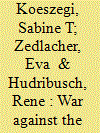

|
|
|
|
|
| Summary/Abstract |
This study intends to analyze the relationship between military culture, masculine norms, attitude toward women, and workplace aggression. By using a paper-pencil survey in the Austrian Armed Forces, we show that overall 6.5 percent of all soldiers in the sample suffer from severe, long-term collective aggression (bullying). The detailed analysis suggests that systematic workplace aggression is associated with a culture with high power orientation and adherence to traditional (masculine) military norms. It occurs most often within socialization processes in training centers as well as in combat units. Conversely, culture in support units has high levels of task orientation with a comparably positive attitude toward female soldiers and less reported workplace aggression. The data reveal the gender dimension of workplace aggression in the Austrian Armed Forces: women are significantly more vulnerable to bullying. Almost every second soldier declares to have observed and every tenth soldier admits to have conducted aggressive acts against women.
|
|
|
|
|
|
|
|
|
|
|
|
|
|
|
|
| 9 |
ID:
137617
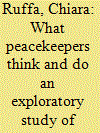

|
|
|
|
|
| Summary/Abstract |
This exploratory article points out how armies differ in the performance of their daily military activities during a peacekeeping mission and analyses the role of contrasting perceptions of the mission operational environment in explaining this variation. As a first step, this article documents systematic variations in the way French, Ghanaian, Italian, and Korean units implement the mandate of the UN mission in Lebanon in their daily military activity. Second, it shows that the four armies also interpret or “construct” the operational environment differently and in a way that is consistent with their different military behavior. Third, preliminary evidence suggests that previous experiences of each army influence the way in which the operational environment is constructed. Data were collected combining participant observation in Southern Lebanon with questionnaires and interviews. This article thus builds on sociological works on different operational styles but takes a methodological approach closer to that in security studies.
|
|
|
|
|
|
|
|
|
|
|
|
|
|
|
|
|
|
|
|
|